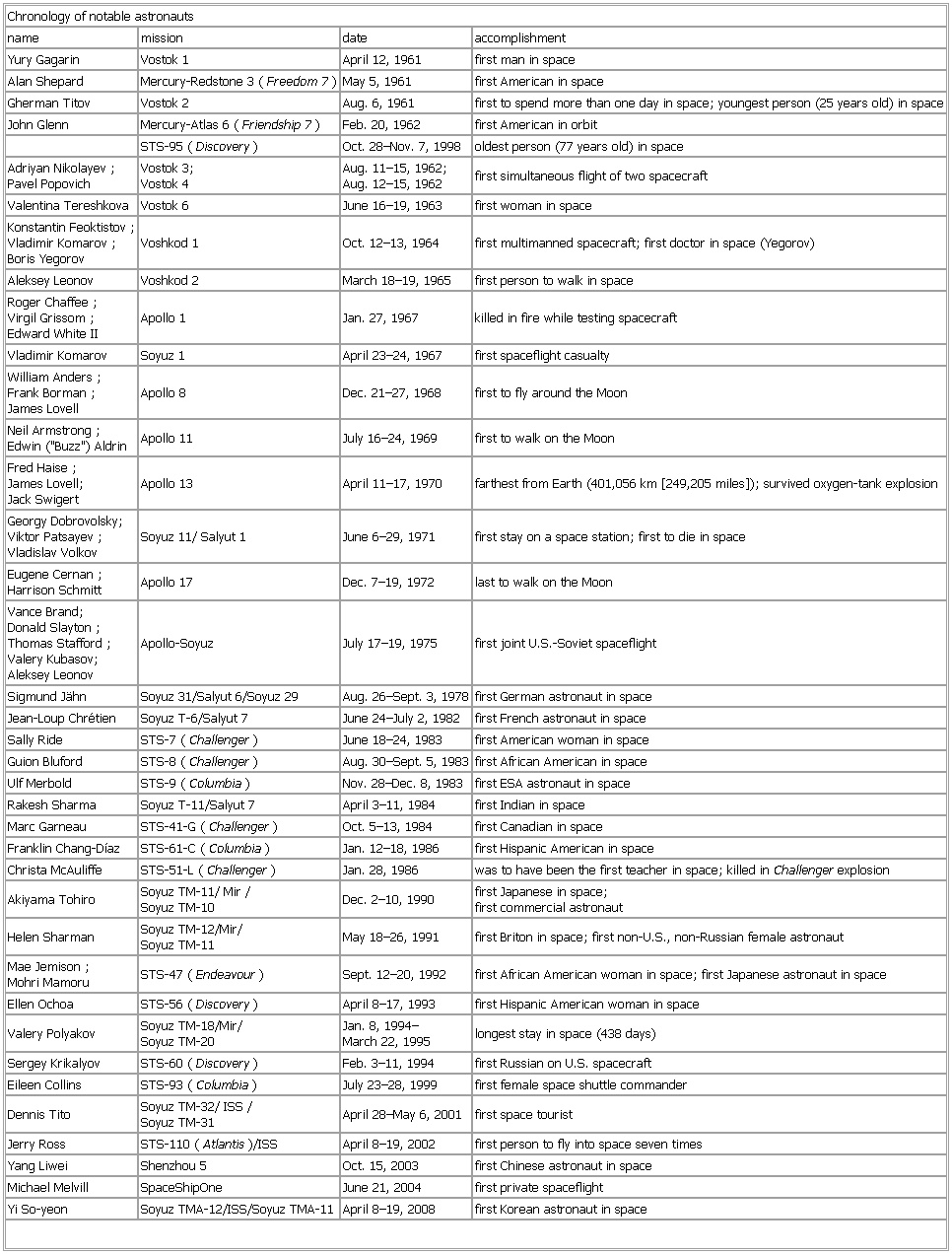- Chronology of notable astronauts
-
▪ TableChronology of notable astronautsname mission date accomplishmentAlan Shepard (Shepard, Alan B., Jr.) Mercury-Redstone 3 (Mercury) (Freedom 7) May 5, 1961 first American in spaceGherman Titov (Titov, Gherman Stepanovich) Vostok 2 Aug. 6, 1961 first to spend more than one day in space; youngest person (25 years old) in spaceJohn Glenn (Glenn, John H., Jr.) Mercury-Atlas 6 (Friendship 7) Feb. 20, 1962 first American in orbitVostok 4 Aug. 11–15, 1962;Aug. 12–15, 1962 first simultaneous flight of two spacecraftBoris Yegorov (Yegorov, Boris Borisovich) Voshkod 1 Oct. 12–13, 1964 first multimanned spacecraft; first doctor in space (Yegorov)Aleksey Leonov (Leonov, Aleksey Arkhipovich) Voshkod 2 March 18–19, 1965 first person to walk in spaceEdward White II (White, Edward H., II) Apollo 1 (Apollo program) Jan. 27, 1967 killed in fire while testing spacecraftEdwin ("Buzz") Aldrin (Aldrin, Edwin Eugene, Jr.) Apollo 11 July 16–24, 1969 first to walk on the MoonJames Lovell;Jack Swigert Apollo 13 April 11–17, 1970 farthest from Earth (401,056 km [249,205 miles]); survived oxygen-tank explosionGeorgy Dobrovolsky;Vladislav Volkov (Volkov, Vladislav Nikolayevich) Soyuz 11/Salyut 1 (Salyut) June 6–29, 1971 first stay on a space station; first to die in spaceHarrison Schmitt Apollo 17 Dec. 7–19, 1972 last to walk on the MoonVance Brand;Valery Kubasov;Aleksey Leonov Apollo-Soyuz July 17–19, 1975 first joint U.S.-Soviet spaceflightSigmund Jähn Soyuz 31/Salyut 6/Soyuz 29 Aug. 26–Sept. 3, 1978 first German astronaut in spaceJean-Loup Chrétien (Chrétien, Jean-Loup) Soyuz T-6/Salyut 7 June 24–July 2, 1982 first French astronaut in spaceGuion Bluford (Bluford, Guion S., Jr.) STS-8 (Challenger) Aug. 30–Sept. 5, 1983 first African American in spaceUlf Merbold (Merbold, Ulf) STS-9 (Columbia) Nov. 28–Dec. 8, 1983 first ESA (European Space Agency) astronaut in spaceRakesh Sharma Soyuz T-11/Salyut 7 April 3–11, 1984 first Indian in spaceFranklin Chang-Díaz (Chang-Díaz, Franklin) STS-61-C (Columbia) Jan. 12–18, 1986 first Hispanic American in spaceChrista McAuliffe (McAuliffe, Christa Corrigan) STS-51-L (Challenger) Jan. 28, 1986 was to have been the first teacher in space; killed in Challenger explosionSoyuz TM-10 Dec. 2–10, 1990 first Japanese in space;first commercial astronautHelen Sharman Soyuz TM-12/Mir/Soyuz TM-11 May 18–26, 1991 first Briton in space; first non-U.S., non-Russian female astronautMohri Mamoru STS-47 (Endeavour) Sept. 12–20, 1992 first African American woman in space; first Japanese astronaut in spaceEllen Ochoa (Ochoa, Ellen) STS-56 (Discovery) April 8–17, 1993 first Hispanic American woman in spaceSoyuz TM-20 Jan. 8, 1994–March 22, 1995 longest stay in space (438 days)Sergey Krikalyov (Krikalyov, Sergey Konstantinovich) STS-60 (Discovery) Feb. 3–11, 1994 first Russian on U.S. spacecraftEileen Collins (Collins, Eileen) STS-93 (Columbia) July 23–28, 1999 first female space shuttle commanderSoyuz TM-31 April 28–May 6, 2001 first space touristYang Liwei Shenzhou 5 Oct. 15, 2003 first Chinese astronaut in spaceMichael Melvill SpaceShipOne June 21, 2004 first private spaceflightYi So-yeon Soyuz TMA-12/ISS/Soyuz TMA-11 April 8–19, 2008 first Korean astronaut in spaceSee as table:

* * *
Universalium. 2010.
